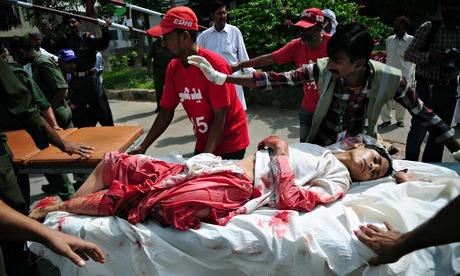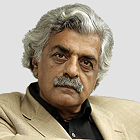Pakistan’s future is tied to the Taliban
![]()
With the impending withdrawal of US troops from Afghanistan, the time has come to talk – despite the horrific wave of bombings

Twelve years ago, a few weeks into the occupation of Afghanistan, I suggested (in these pages) that the euphoria aroused by an easy conquest was misplaced. It would be a long war and one of its side effects would be to seriously destabilise Pakistan. Unfortunately, events have not contradicted the analysis. The spillover into Pakistan has been creating havoc for years. The view that this has nothing to do with Afghanistan is too shallow to deserve serious consideration.
It’s no secret that, since 9/11, successive governments –Musharraf, Zardari and now the Sharif brothers – have agreed to US drone attacks and been aware of covert CIA operations being carried out in Pakistan. Opinion polls, however, reveal that a large majority of Pakistani citizens are opposed to US policies. The capitulation of liberal secular parties to Washington left the field wide open to armed groups of religious fundamentalists, who began to challenge the state’s monopoly of legitimate violence, presenting themselves as defenders of both Islam and the victimised Pashtuns in Pakistan. Their claims are false.
Last year alone the TTP (Pakistani Taliban Movement), the largest of the armed fundamentalist groups, carried out hundreds of attacks in different parts of the country, massacring several hundred innocents and half that number of security and military personnel. Who were the dead? Christians in Peshawar, Shias in other parts of the country, naval ratings in Karachi, intelligence operatives, and policemen and soldiers everywhere.
Attempts by the military over the years to clear them out from certain areas they occupied (Swat being the best example) failed for two reasons: the military steamroller is clumsy and reckless, often achieving the exact opposite of what it has set out to do before having to withdraw; and, second, once the soldiers return to barracks, the civilian infrastructure is far too weak to resist armed intrusions by the militants. The pattern is repeated and nothing changes.
A few weeks ago the TTP targeted military headquarters in Rawalpindi, killing soldiers and civilians. As the prime minister, Nawaz Sharif, arrived to visit the wounded in a local hospital, crowds of angry citizens chanted the choicest Punjabi abuse against the TTP and demanded action. A shaken Sharif authorised one of his closest ministers to virtually declare war: the Pakistani air force was despatched to target TTP headquarters. The TTP leaders were shocked, and suggested immediate talks with the government.
They asked Imran Khan, leader of the PTI – the provincial government in Pakhtunkhwa province, which borders Afghanistan – to be part of their delegation. Embarrassed by the request, he refused. But others have been found, including Sami-ul-Haq, the creepy cleric touted as the “father of the Taliban”. Nawaz Sharif has decided to back off from military action, and talks are expected to start very soon. They may produce a temporary ceasefire, but not much more.
However horrific the spate of recent bombings, the heart of the problem remains Afghanistan. It is not the case that the TTP and related networks are so powerful that their leaders cannot be found, captured, charged and punished. The fact is that, with the impending withdrawal of the US from Afghanistan, Pakistan’s intelligence service, the ISI, and its bosses in Pakistan cannot afford to offend the TTP too much. Islamabad has developed the theory of “strategic depth”: keeping Afghanistan out of the hands of India’s allies as a defensive strategy against India. This was always slightly absurd, given that both India and Pakistan are nuclear powers and any serious conflict would be a disaster for both countries.
Also, the Pashtuns in Afghanistan have always resented the British division of their lands and quite a few in Pakistan feel closer to their Afghan brethren than the regimes in Islamabad. The Taliban veil has masked this hostility and given it religious colours, but, underneath it all, the national question remains strong. If a section of the ISI supports the armed networks, it is difficult for other wings of the ISI to close it down.
A lasting solution, which may well not be the one favoured by many Pakistanis, will come after the US and its auxiliaries have left the country. The puppet president, Hamid Karzai, is aware of all this, which is why he has declared: “The Taliban are our brothers,” and denounced the British presence in Helmand. He will probably try to promote Pashtun nationalism to weaken Islamabad. The stakes are high for all sides.
Related Articles
Hollande presenta sus «pruebas» en medio de crecientes críticas internas
![]()
Crisis Siria El Gobierno francés presentó un informe basado más en convicciones que en pruebas contra el Gobierno de Damasco
48 años de bloqueo estadounidense
![]()
Entrevista a José A. Fernández Estévez, Consejero Económico-Comercial de la embajada de Cuba en España Ramón Pedregal Casanova Rebelión El
UN Report: Afghan Civilian Deaths Up 31%
![]()
Public Executions by Insurgents on the Rise According to the UNAMA (United Nations Assistance Mission in Afghanistan) report for



